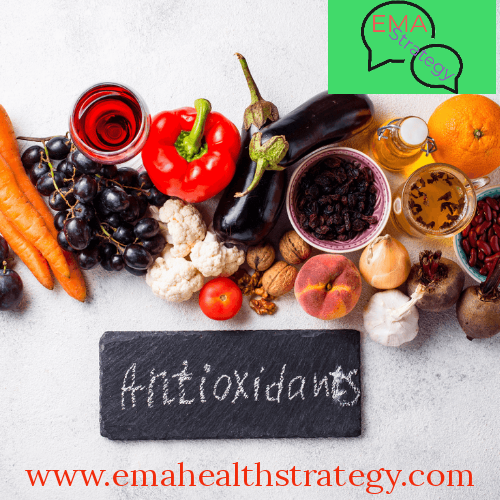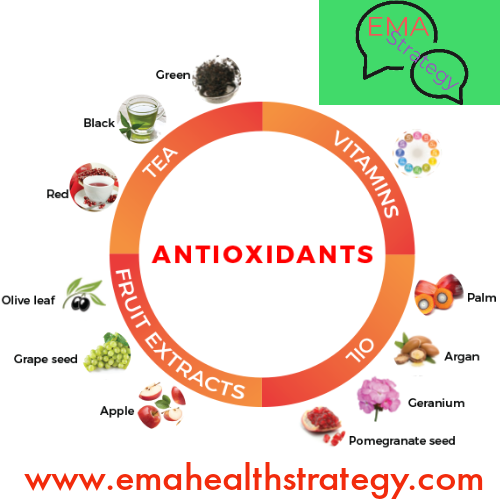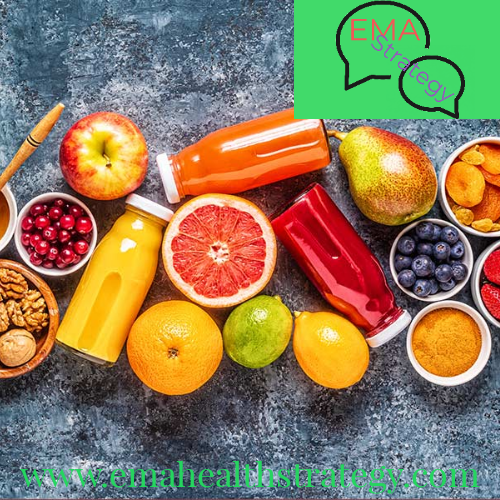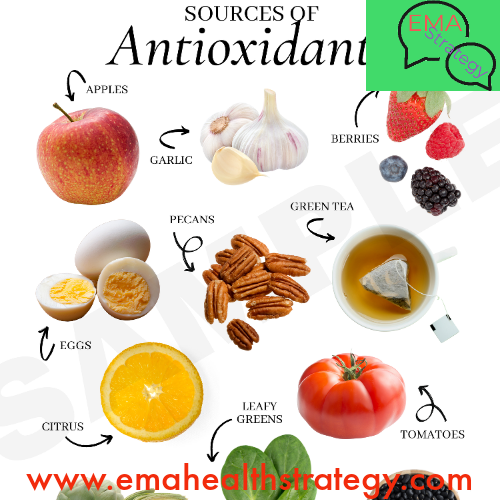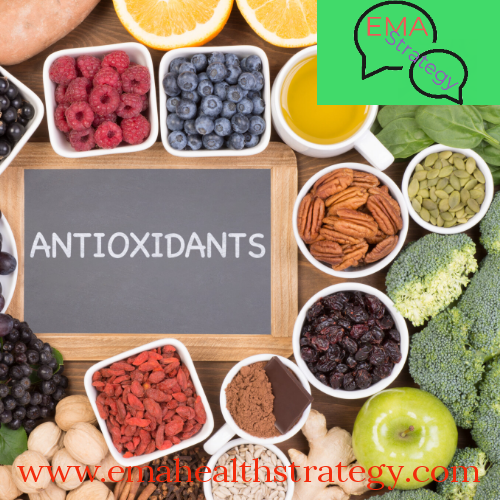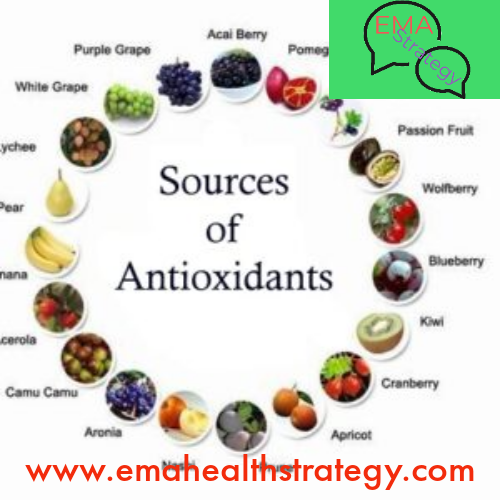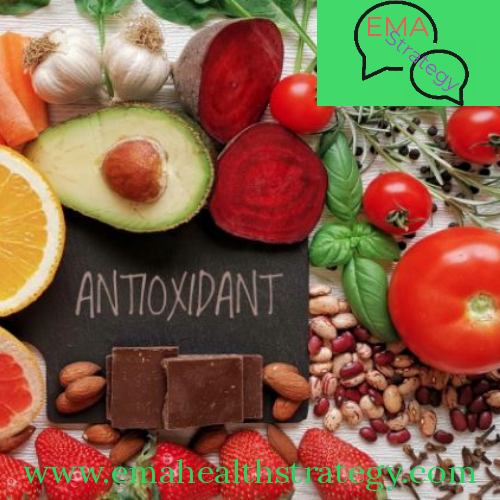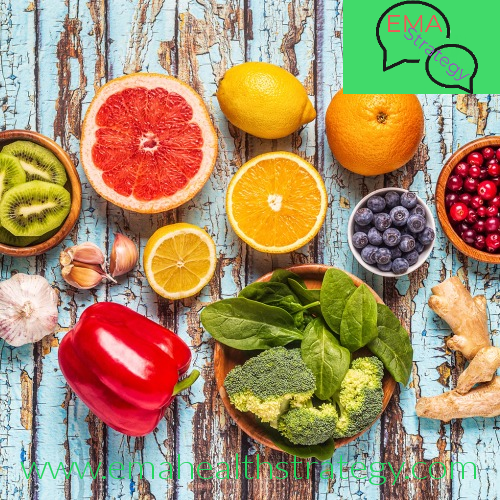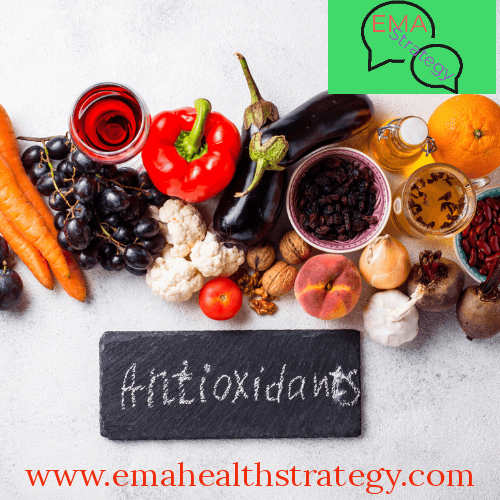What are the health benefits of antioxidants
Antioxidants can be described as those substances that has the potential to fight the effects of unstable molecules called free radicals.
Free radicals are formed when the body atoms gain or lose a charged electrons. Meanwhile, free radicals have a good and bad impact depending on the reaction conditions.
They do play an important role in various biological processes especially in cell division, but it's accumulation can cause oxidative stress which is a key factor for all chronic diseases.
Thus, a high antioxidant diets can lower the risk of metabolic diseases including heart disease and certain cancers.
Antioxidants combat free radicals from the body cells and prevent the damage caused by oxidative reactions.
There is on going studies of protective effect of antioxidants around the world in order to truly ascertain the extent of it's essential to healthy living.
As research keeps evolving, there is evident that antioxidants more especially excess of it, may not always be beneficial in certain situations.
Uncontrollable amounts of antioxidants may counter other important body functions in the cell, such as its defense mechanisms and normal signaling.
Vitamins C and E are the the most essential among the vitamins that acts as a natural antioxidants.
Ascorbic acid and its oxidation derivative dehydroascorbic acid in vitamin C, exhibit numerous biological activities in the human body.
And more than 85 percent of dietary vitamin C are gotten from fresh fruits and vegetables.
Garlic with a botanical name as Allium sativum L originated from western Asia and Mediterranean coast, and has been used as spice and natural medicine.
Hence, it is known to contain natural antioxidants that can remove reactive oxygen species (ROS) and reduce lipid peroxides and low-density lipoprotein (LDL) oxidation.
Respectively, dietary antioxidants have been observed for its ability to inhibit the possibility of several infectious pathogens.
It has been established that if antioxidant properties are to be provided by a particular diet, that vitamins should be applied before the consumption of such diet for optimal efficacy.
In other hand, if the beneficial properties of antioxidant vitamins needed more time to function efficiently, then vitamins are to be taken as early as possible.
Glutathione is most of the times referred to as “master antioxidant” due to some good reasons:
It is the most potent antioxidant that our bodies make.
Other essential antioxidant are:
---Astaxanthin
---Vitamin C
---Co-enzyme Q10
---Vitamin E
---Selenium
---Folic acid
---Dark Chocolate
---Pecans
---Blueberries
---Strawberries
Note that Fresh or frozen fruits especially berries (blueberries, blackberries, raspberries, strawberries and cranberries) are among the top fruit sources of antioxidants).
Other fruits high in Antioxidant
On the color wheel, the purple-blue-red-orange spectrum is home to the most antioxidant-rich fruits, wild blueberries are the winner overall.
Just one cup has 13,427 total antioxidants - vitamins A & C, plus flavonoids (a type of antioxidant) like querticin and anthocyanidin.
Foods high in Antioxidant
Plant-based foods such as fruits, vegetables, whole grains, nuts, seeds, herbs and spices, and even cocoa are the best sources of antioxidants according a practical evidence.
Drinks rich in Antioxidants
The following beverages are rich in antioxidants, including:
---green tea
---matcha
---blueberry juice
---pomegranate juice
---acai berry smoothies
---beetroot juice
---cranberry juice
---red wine (in moderation)
---cherry juice
---ginger turmeric tea.
Side effects of antioxidants
Constipation, diarrhea, or stomach upset may occur.
These symptoms are often temporary and might cease as the body adapt to the medication.
If any of these effects persist, do not hesitate to consult a professional medical practitioner earlier enough.
Banana as an antioxidant
Can bananas boost the body antioxidants?
Fruits and vegetables are excellent sources of dietary antioxidants, and bananas are no exception.
They contain several types of potent antioxidants, such as flavonoids and amines.
These antioxidants are associated with various health benefits, like a reduced risk of heart disease and macular degeneration.
Honey as an antioxidant
Honey is majorly made up of sugar, with appropriate mixture of amino acids, vitamins, minerals, iron, zinc and antioxidants.
It do not only serve as a natural sweetener, but also as an antioxidant, anti-inflammatory, and antibacterial agent.
Folic acid as an antioxidant
It has been established that folic acid, and especially its derivatives can directly and/or indirectly exhibit antioxidant effects.
Vitamin C as an antioxidant
Vitamin C as an antioxidant, helps protect the cells against the effects of free radicals (molecules as a resulted of breaking down of food or exposure to tobacco smoke and radiation from the sun, X-rays or other sources).
Free radicals play a fundamental role in heart disease, cancer and other diseases.
Astaxanthin as the king of Antioxidants
As a matter of fact, the unique structure of astaxanthin makes it potentially able to reach the cell membrane, thereby providing an antioxidant protection to both the inner and outer cellular wall, including the intra-membrane space.
These factors qualifies astaxanthin as 'the king of antioxidants'.
Antioxidant as a detox
Adequate antioxidant supply is essential for maintaining metabolic homeostasis and reducing oxidative stress during detoxification.
Some health benefits of antioxidants
---Helps with heart disease
---Protects against atherosclerosis
---Prevents hypertension
---Reduces the risk of Cancer
---Improves vision health
---Lowers inflammation rate
---Combats free radicals
HELPS WITH HEART DISEASES
Research findings indicates that antioxidants have the potential to improve the heart health and can protect the body against coronary heart disease (CHD).
Most essentially, the antioxidants gotten from consuming a healthy diet with adequate fruit, vegetables, whole grains, beans, legumes, and nuts are major components of a heart-healthy lifestyle.
A diet rich in antioxidants can lower the risk of many diseases such as heart disease and certain cancers.
This is possible because, antioxidants fights free radicals from the body cells and manage the damage caused by oxidation. Meanwhile, the studies of antioxidants protective effect is ongoing around the world in order to fully understand its other positive impact on human body.
PROTECTION AGAINST ATHEROSCLEROSIS
Atherosclerosis can be described as the process of accumulation of plaque in the walls of the arteries.
Antioxidant therapy may inhibit atherosclerosis, hence prevent the clinical complications of the disease such as CAD, and in particular, MI.
In healthy individuals, antioxidants protect components of the body against free-radical damage.
Natural and synthetic antioxidants enhances atherosclerosis prevention and treatment through various mechanisms, including the inhibition of LDL oxidation, declining in the amount of the deposited reactive oxygen species, the blockage of cytokine secretion, the prevention of atherosclerotic plaque formation and platelet aggregation, the inhibition of mononuclear cell infiltration, the improvement of endothelial dysfunction and vasodilation, the promotion of NO bioavailability, the regulation of the expression of adhesion molecules and the suppression of foam cell formation.
PREVENTS HYPERTENSION
It has been shown that sufficient dietary antioxidant intake and polyphenols are essential to reduce and prevent hypertension.
According to a detailed research report, it is confirmed that diets high in antioxidants such as fruits and vegetables can reduce blood pressure and cardiovascular diseases, but not exactly the case for supplements.
REDUCES THE RISK OF CANCERS
Antioxidants are substances that have the ability to hinder the oxidation process, thus are referred to as a protective agents.
They protect the body from the damaging effects of free radicals (the outcome of the body's normal chemical processes).
Free radicals attack healthy cells, thereby altering their DNA and enabling the growth of tumors cells that in accumulation develop into cancer.
Naturally, antioxidants play a key part in regulating the levels of reactive oxygen species (ROS) in the cells, through prevention of metastasis or enhancement of apoptosis, which can kill cancer cells.
They can also act control cell cycles, such as apoptosis, inflammation, angiogenesis, and metastasis.
Moreover, natural compounds can also have an antioxidant properties by protecting against free radicals, which changes the structure of DNA and cell membranes as already stated above.
IMPROVES THE VISION HEALTH
It has been widely known that the macula is essential for vision.
And lutein and zeaxanthin are important antioxidants on this regard, protecting the eyes from damaging effects of free radicals.
A 2020 research review has shown that neutralization of the activities of free radicals over time can protect the retina from photo-damage.
Though vitamins A, C and E are nutrients with antioxidant properties that can benefits the eyes, but compounds such as carotenoids, flavonoids and the mineral selenium are also helpful nutrients to be incorporated in diets for healthy eyes.
Series of studies have proven that antioxidants can stimulate immune function, regulate gene expression, and lower inflammation rate, which are all important factors in the development and progression of eye diseases.
Antioxidants inhibit the harmful effect of free radicals.
It was noted that antioxidants are helpful in AMD because of the “free radical” theory of cell damage.
During cell 'oxidation' (chemical processes that regulate cell functions), there is a release dangerous waste substances known as 'free radicals'.
Antioxidants can prevent cataract development by countering lens opacification.
And a condition of excess amount of reactive oxygen species becomes harmful to the lens proteins.
Exogenous (dietary) antioxidants and endogenous antioxidants (eg, antioxidative enzymes) may protect the lens against oxidative stress.
In 2013, laboratory research reports that an antioxidant known as alpha-lipoic acid helped to protect retinal ganglion cells, which are essential for vision and damaged by oxidative stress in the glaucoma.
LOWERS INFLAMMATION RATES
Antioxidants play a vital role in the expression of transcription factors involved in the immune response, facilitate the inhibition of pro-inflammatory cytokines, prevent major signaling pathways and enzymes involved in immune processes.
Due to the anti-inflammatory effects of the antioxidants in broccoli, especially sulforaphane, an antioxidant that reduces inflammation by declining the cytokines levels and nuclear factor kappa B (NF-κB), molecules that encourages inflammation in the body.
According to an expert described as Brown, the active ingredient in turmeric is a natural compound called curcumin, a polyphenol in which it's antioxidant effects lead to anti-inflammatory potential.
In 2012,Handy and Loscalzo described the properties of the main cellular antioxidants enzymes, such as superoxide dismutase (SOD), catalase (CAT), glutathione peroxidase (GPx), glutaredoxins (Grx), and peroxyredoxins (Prx), and established that especially SOD provide a major defensive effect against ROS.
Niacinamide which is also known as vitamin B3, is a potent antioxidant that promotes a healthy skin.
It prevents and reduces fine lines, wrinkles and hyperpigmentation, hence portraying "anti-inflammatory properties,” analyzed Dr. Rhonda Klein, a board-certified dermatologist in Connecticut.
COMBATS FREE RADICALS
Free radicals are unstable molecules that lacks a full complement of electrons, thus always receive electrons from other stable molecules, thereby damaging those molecules in the process.
Antioxidants has the potential to neutralize the action of free radicals by donating their own electrons to caution that harmful effect.
In course of this sacrifice, they function as a naturalization compound to the free radicals.
Therefore, an antioxidant can be regarded as a molecule stable enough to donate an electron to a harmful and unstable free radical molecules in order to neutralize it, thus lowering its damaging capabilities.
The level of reactive oxygen species in the cellular system can be decreased by antioxidants either by restricting the actions of free radical-producing enzymes such as xanthine oxidase (XO) and NAD(P)H oxidase, or by promoting the expression and activities of antioxidant enzymes such as glutathione peroxidase (GPx), catalase (CAT), and superoxide dismutase (SOD) (Aziz et al., 2019).
The antioxidants effect of enzymes can directly or indirectly catalyze the ROS to protect the cells.
Non-enzymatic antioxidants can neutralize the oxidative effect by enhancement of anti-oxidative enzyme or directly processing oxidative chain reaction.
Meanwhile, the metabolic mechanism of antioxidants operations, involves decreasing the oxidative damage directly by reacting with free radicals or indirectly by withstanding the actions of free radical inducing enzymes or enhancing the activity or expression of intracellular antioxidant enzymes.
Free radicals result from various normal biological processes including aerobic metabolism and pathogenic defense mechanisms.
They can be also due to the external exposures such as radiation, pollutants, and cigarette smoke.
Reactive oxygen species (ROS), are a type of free radicals that contain oxygen.
SUMMARY
An antioxidant is a natural or synthetic substance that in its small amount has the potential to prevent, inhibit, or delay the damage of oxidative vulnerable nutrients such as lipids and proteins caused by the oxidation reactions of oxygen, thereby regulating the reaction processes (Apak et al., 2007; Becker et al., 2004; Huang et al., 2005).
Therefore, the essence of antioxidant compounds in foods are to decline or inhibit oxidation, especially in food components that are high in oils and unsaturated fats (Abou-Arab and Abu-Salem, 2010; Andreo and Jorge, 2006).
Adequate consumption of food rich in antioxidants will extend the life span due to improved disease prevention (Ordóñez et al., 2005) and the inhibition of the free radical-induced damages.
Among the numerous functions performed by antioxidants are; capturing free radicals, reducing agent tendency, chelating metal ions, inhibiting oxidation reactions, lowering oxygen content, and termination of oxidative processes (Apak et al., 2007; Brewer, 2011).
Antioxidant efficiency depends on the activation energy, the composition of its chemical structures and their metabolism, the absorption extent, the oxidation–reduction potential, the solubility, and the volatility (Balasundram et al., 2006; Brewer, 2011).
Antioxidants can be classified either by their activities in the oxidation chain reaction or their role in the oxidative chain reaction, antioxidants also can be grouped as primary (chain-breaking promoters) or secondary (preventive) (Angelo and Jorge, 2007; Apak et al., 2007).
As primary compounds, antioxidants transfer hydrogen atoms or donate electrons to counter free radicals that were formed during the formation stages, thus deactivating the reactive species by resonance.
The outcome of this reaction is a stable compound, thereby terminating the oxidative chain reaction(Brewer, 2011; Leopoldini et al., 2011; Wanasundara and Shahidi, 2005; Yogesh and Ali, 2014). Antioxidants act as a secondary compound by delaying the rate of oxidation, such as complexing metal ions (i.e., iron and copper) that catalyze oxidation; replacing hydrogen for primary antioxidants; capturing oxygen and deactivating oxidative reactions through enzymes such as glucose oxidase, superoxide dismutase, and catalase; absorbing UV; and decomposing hydroperoxides (Angelo and Jorge, 2007; Reische et al., 2002; Wanasundara and Shahidi, 2005).
In consideration of their origin, antioxidants may be synthetic or natural, which are currently the most prevalent applied types of antioxidants in the food industry worldwide.

